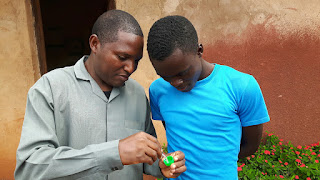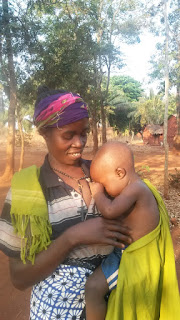 I was last at the Safe House in early January, just after
the cutting season had finished. Most of
the girls who had sought refuge then were slowly being reunited with their
families. Sophia, the social worker and
Rhobi, were painstakingly negotiating affidavits with the parents, guaranteeing
that they would not cut their daughters or marry them against their will. With
thirty four girls the parents refused to cooperate and so they remained at the
Safe House. At that time these girls
were very shy, and many visibly traumatised by their experience.
I was last at the Safe House in early January, just after
the cutting season had finished. Most of
the girls who had sought refuge then were slowly being reunited with their
families. Sophia, the social worker and
Rhobi, were painstakingly negotiating affidavits with the parents, guaranteeing
that they would not cut their daughters or marry them against their will. With
thirty four girls the parents refused to cooperate and so they remained at the
Safe House. At that time these girls
were very shy, and many visibly traumatised by their experience.
So it is heart-warming to be back in Mugumu to see what a
difference 5 months has made. There are
now computer lessons in a room of 30 computers donated by a London school, and
girls on the tailoring course are now selling items they have made in a shop on
the premises. Girls who have never had
the chance to go to school can now read and write. Their growth in confidence is astounding.
On
Tuesday the girls performed a song they had composed about FGM to over 500
people at an event for International Day of the African Child.
Ten of the girls passed their primary education and so
attend the local secondary school. Their
headmaster and teachers told me although they have missed a lot of education
they are trying so hard they are sure they will catch up. I set up a projector
and raspberry pi
computer with content from World Possible in both the Safe House and the school
so they can access Wikipedia and Khan Academy offline, giving them a huge range
of educational content. I also set
installed 200 Swahili and English e-books from African Storybook. These were a great hit for girls who have
never had access to books, as were the Swahili audiobooks and maths cartoons
from Ubongo.
Word games my sister in law donated like scrabble and
Headbanz where players have to ask yes no questions to guess the card on their
head caused great hilarity and enabled girls to practice their English in a fun
way...
I also met Christina, a circumciser, who has previously cut
girls in the local village of Kebanchabancha.
She witnessed the anti FGM road show Rhobi organised in her village and
decided to stop cutting and publicly destroyed her tools. This cost her dearly, she lost her source of
income her husband divorced her, and she has had to move away from the village
due to the pressure of people trying to persuade her to change her mind. However she told me she did not regret her
decision and now plans to become a peer educator helping persuade other circumcisers
follow her lead.You can hear her story here.
So, the tide is turning..
But the Safe House still faces huge challenges. Now it is known as a place of refuge, the
local police bring people here who have nowhere else to go.. Lucy, an albino rape victim, Sophia and
Veronica, two abandoned children and Msambo with her baby, beaten so badly by
her husband that she lost 3 teeth.
It still needs a perimeter fence, to stop people wandering
in, a dining hall and kitchen, and a car, so that girls in the villages can be
reached, and there is not a repeat of the incident in December when the car
broke down so 5 escaping girls were captured by their parents..
So, if you are able to help, everyone at the Safe House, and
the girls at risk of FGM in Serengeti would be extremely grateful..
 Rhobi was expecting a relatively quiet cutting season this year as most of the Kuria tribe in Serengeti only cut on alternate years.
Rhobi was expecting a relatively quiet cutting season this year as most of the Kuria tribe in Serengeti only cut on alternate years. 











































